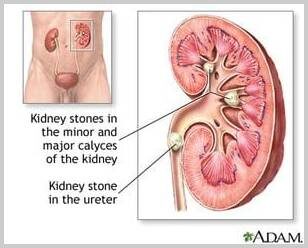
Kidney Stones
A kidney stone, also known as a renal calculus or nephrolithiasis, is a hard, rock like mass of mineral and acid salts that separates out from the urine and travels through the urinary tract. It can sometimes cause an obstruction. The urine normally dilutes and dissolves these substances from forming into stones, but when the composition of urine is unbalanced, crystallized stones can form. Kidney stones are a common but painful urinary-tract disorder. They can be found in both genders, but men are more likely than women to get them. Kidney stones can cause severe pain, but usually do not cause any permanent damage to the urinary tract or body. They can get stuck and unable to pass on their own. In these cases, they generally require surgery to remove them.
Causes of Kidney Stones
Kidney stones can form when substances in the urine such as calcium, uric acid, oxalate and phosphorus become highly concentrated. Although the exact cause of kidney stones cannot always be determined, people with the following risk factors are more likely to form them:
● Family history of kidney stones
● History of gout
● Chronic diarrhea or malabsorption disorders
● Crohn's disease
● Obesity
● High level of calcium in the urine
● Those who work outside
● Those who do not drink enough fluids
● Those who have high sodium, high sugar or diets high in soda or tea intake
● Some medications can increase risk
Symptoms of Kidney Stones
Most kidney stones cause severe pain as they move through the urinary tract and into the ureter. .Pain can be accompanied by symptoms including the following:
● Severe pain in the lower side and back
● Pain radiating to the abdomen and groin
● Bloody or cloudy dark urine
● Frequent and painful urination
● Nausea and/or vomiting
● Fever or chills
Diagnosis of Kidney Stones
Kidney stones are diagnosed through a physical examination, review of symptoms and imaging studies. Diagnostic tests include the following:
● Blood tests
● Urine tests
● Intravenous pyelogram (IVP)
● Imaging such as CT scan
Treatment of Kidney Stones
Treatment is not usually necessary for little kidney stones. These are generally able to pass on their own, although it may take some time. Pain medication or medication to relax the ureter (tube that drains from kidney to bladder) may be prescribed to relieve symptoms. A large kidney stone that cannot pass on its own, or that blocks the urinary tract and is unable to pass, may require more definitive treatment such as a ureteroscopy. More-invasive surgery may be necessary to remove a very large stone such as PCNL (procedure where an incision is made through the back to remove a stone using a laser)
Prevention of Kidney Stones
Although not all kidney stones can be prevented, certain lifestyle modifications may help to reduce the risk of developing them:
• Drinking plenty of fluids especially water. Adding some lemon to water may help
• Reducing fat intake
• Eating a low-salt diet, decreasing sugar in diet
• Limiting tea and soda
• Medication that helps to control levels of minerals and acid in urine of people who are prone to developing kidney stones may also be recommended
• Metabolic workup with nephrologist may be recommended for recurrent stone formers
